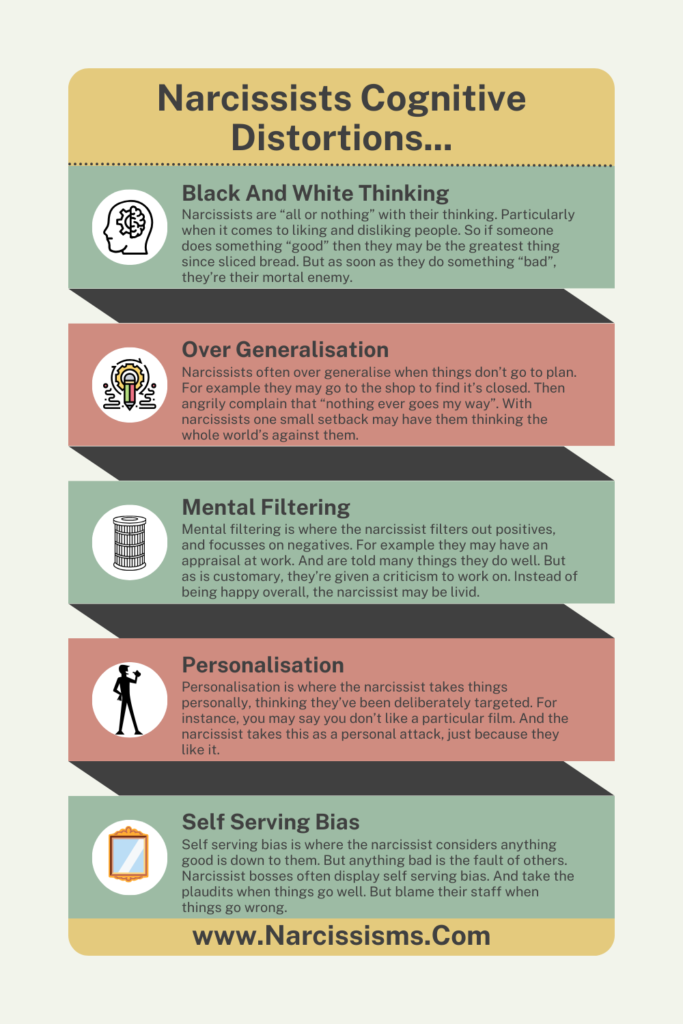Cognitive distortions are exaggerated thought patterns. And can turn minor issues into major catastrophes.
Whilst cognitive distortions aren’t exclusive to narcissists, they’re more prevalent amongst them. And they explain many of their unusual thoughts and behaviours. Giving you valuable insight into the workings of their mind.
Most of us have cognitive distortions throughout our lives. Especially during challenging times. And if you can recognise and control them, you’re in a much better place mentally. Because you have a better grasp on reality. Which helps reduce depression and anxiety. Which in turn helps you to achieve your goals, and live a more fulfilling life.
This article helps you understand narcissists AND aids your personal development. Making this a valuable read. So please remember to share this article and spread the word!
So without further ado, here’s some of the most common cognitive distortions that narcissists suffer from…
Please Check Out This Short Video To Aid Your Understanding…
Polarised Thinking
Polarised thinking is “all or nothing”, or “black and white” thinking. Which involves interpreting something to it’s extreme. Ignoring its shades of grey.
Narcissists typically do this when it comes to liking and disliking people. If someone does them a good turn, then they may think they’re the most wonderful person on Earth. But if this same person does something they don’t like, then they’re painted black. And may be considered the most awful person to darken this plague ridden hell hole.
Narcissists even polarise their loved ones. And may feel genuine hatred when they think they’ve been hurt by them. Whereas a healthy minded person may be annoyed, but they still love them. And understand that they’re not all bad.
Polarised thinkers sets unrealistically high standards for themselves and others. For example they may pride themselves on never taking a day off work. So when they eventually do, they feel like a complete failure. If they’re the boss, then they may hold their subordinates to this same unrealistically high standard.
Over Generalisation
Narcissists often over generalise when things don’t go their way. For example they may go to the shop and find it’s closed. Then brood to themselves, “nothing ever goes my way”.
They return with a face like thunder, in a foul mood for the rest of the day. All because the shop is closed.
Their family is puzzled as to why this upsets them so much. But in the narcissists mind, this confirms the futility of their existence. Believing nothing EVER goes their way.
Over generalisation may also affect the narcissists’ judgements of others. For instance a friend may uncharacteristically turn up late when meeting them. And from then on, the narcissist always expects this. And may repeatedly dish out subtle digs.
Mental Filtering
Mental filtering is where the narcissist filters out positives, and focusses on the negatives.
For example they may have an appraisal at work. And are told many things they do well. And as is customary, they’re given a criticism to work on.
The narcissist focusses on this criticism. And dwells on it, thinking they’ve had a poor appraisal. Even though everything else was good. So they may conclude that they’re a poor worker, or that their boss has it in for them.
A narcissist may also filter the other way. And only focus on the positives. So they may receive a bucket load of criticism. Yet still think they’re Handsome B. Wonderful.
Personalisation
Personalisation is where the narcissist takes things personally, thinking they’ve been deliberately targeted. But really they’ve wrongly taken things to heart.
For instance, you may say you don’t like a particular film. And the narcissist takes this as a personal attack, because they like it. In their head you’re criticising people who like this film. So therefore you’re criticising them.
Personalization happens a lot in the work place. A senior might say that a department needs improving. And the narcissist takes this as a personal attack, even though they’re not in charge. All because they’re one of many workers in that department.
Narcissist parents may take criticisms of their children personally. Because they see it as an attack on their parenting. So when a teacher or carer offers constructive criticism, they may be met with a volley of abuse.
Self Serving Bias
Self serving bias is where the narcissist has their cake and eats it. They consider anything good is down to them. But anything bad is outside their control. And usually the fault of others.
Narcissist bosses often display self serving bias. And take the plaudits when things go well. But blame their staff when things go wrong.
Jumping To Conclusions
Narcissists often jump to conclusions. And “know” something without any evidence to back it up.
For instance, they may see a random stranger in the street. And “know” that this was the hoodlum who damaged their car. Despite zero evidence.
Narcissists are notorious for putting words into peoples mouths. And may accuse you of being critical towards them, despite you saying nothing. They may even claim they know what you are thinking.
Catastrophising
Catastrophising is jumping to dyer conclusions when faced with the unknown. No matter how unlikely it is. Catastrophising is often characterised by “what if” statements.
For example, a narcissist may be preparing for a long drive. And are worried that their tyre might burst. You point out that they have a spare. But they counter, “Yeh, but what if that bursts too?”
Catastrophising is thinking about the worst case scenario, and believing it will happen. Despite overwhelming odds against it. And it can make relatively simple things feel incredibly stressful.
A narcissist might be going on holiday. And worry that the taxi won’t turn up to take them to the airport. And if it does, it might break down. And even if it doesn’t, then the plane might be cancelled. And so on.
Maximising
Maximising is where the narcissist makes a mountain out of a molehill. And perceives small setbacks as huge affairs.
For instance, they may have a small grievance at work. But blow it up so much that they feel it’s the greatest injustice in the history of mankind. And may even feel it deserves recognition in the national press (this is a true example!).
Narcissists see themselves as the centre of the universe. So if something involves them, then they often assume it’s a much bigger deal than it is. Because they can only see things from their own perspective. So if it’s a big deal to them, then it MUST be a big deal to everybody else.
Minimising
Minimising usually occurs when the narcissist experiences something positive, then plays it down.
For example, you might make a huge fuss over their birthday. And you tell them that you went to such lengths because they’re so special. But they play it down saying, “You only did this because you felt you had to.”
Or their boss at work may sing their praises for a job well done. But the narcissist thinks they only said this to butter them up to agree to overtime.
Labelling
Labelling is where the narcissist rigidly labels someone with a characteristic. And it’s usually negative.
The narcissist may label someone after one isolated event. And think that this is what they always do.
So if they meet someone who’s had too many drinks, then they might label them a drunk. And take the attitude that they’re always drunk. Despite this being the only time they’ve seen this.
A narcissist may also label themselves. And may for example consider themselves a “failure” if they did something wrong.
Always Being Right
This is where the narcissist considers their opinions as facts. And if they think something, then it must be so. Regardless of evidence.
When you quiz them, they may say something like, “I just know I’m right”. And if you press them, they may get angry. Because you’re challenging their way of thinking. And they don’t want their delusions shattered.
Final Thoughts
These cognitive distortions help you understand narcissists thinking. And if you have a narcissist in your life, then you may be able to help them. But be gentle, because accusing them of a cognitive distortion won’t get them on board. Instead, help them refocus their mind.
For instance if they’re feeling down after mentally filtering an appraisal at work. Point out all the good things they’ve been praised for. And help them direct their focus on that. Most narcissists will actually be grateful for this. Especially if you liberally sprinkle some compliments that tell them how great they are!
Don’t feel bad if you recognise some of these cognitive distortions in yourself. In fact it’s a good thing. Because most of us have cognitive distortions from time to time. And if you can recognise them, you’re more likely to break their spell.
Overcoming cognitive distortions helps you reduce depression and anxiety. And makes the challenges of life far easier to navigate. Which helps you in almost every aspect of your life.
Be honest with yourself if you recognise them. And remind yourself when you next catch yourself in the act. Talking therapies, such as counselling and CBT may help you shake these limiting thoughts.
It’s impossible to change the world around you. But you CAN change how you think about it. And this effectively changes your world. Because your mind believes what you tell it. Whether it’s good or bad. So why not choose to be positive?

Please CLICK HERE To Learn About Narcissists Delusional Thinking
Or Scroll Down For My Most Popular Posts (Mobile)…
Narcissists Delusional Thinking
